
House of Flying Daggers is a 2004 wuxia romance film directed by Zhang Yimou and starring Andy Lau, Zhang Ziyi and Takeshi Kaneshiro. Unlike other wuxia films, it is more of a love story than purely a martial arts film.

Jia Zhangke is a Chinese-language film and television director, screenwriter, producer, actor and writer. He is the dean of the Shanxi Film Academy of Shanxi Media College and the dean of the Vancouver Film School of Shanghai University. He graduated from the Literature Department of Beijing Film Academy. He is generally regarded as a leading figure of the "Sixth Generation" movement of Chinese cinema, a group that also includes such figures as Wang Xiaoshuai, Lou Ye, Wang Quan'an and Zhang Yuan.

The World is a 2004 Chinese drama written and directed by Jia Zhangke about the work and the life of several young people moving from the countryside to a world park. Starring Jia's muse, Zhao Tao, as well as Cheng Taishen, The World was filmed on and around an actual theme park located in Beijing, Beijing World Park, which recreates world landmarks at reduced scales for Chinese tourists. The World introduces new technologies like binoculars, coin-operated telescopes, digital cameras, mobile phones and digital services in the theme park as touristic tools to virtually travel around the world, emphasizing the globalization and convenience. It is a metaphor for Chinese society to experience the sense of mobility, but the knowledge is still limited domestically and the environment of simulation is seen as a sense of escaping from the real world. The World was Jia's first film to gain official approval from the Chinese government. Additionally, it was the first of his films to take place outside of his home province of Shanxi.

The Banquet, released on DVD in the United States as Legend of the Black Scorpion, is a 2006 Chinese wuxia drama film. The film was directed by Feng Xiaogang and stars Zhang Ziyi, Ge You, Daniel Wu and Zhou Xun. It is a loose adaptation of William Shakespeare's tragedy Hamlet set in the Five Dynasties and Ten Kingdoms period in 10th century China.

Still Life is a 2006 Chinese film directed by Jia Zhangke. Shot in the old village of Fengjie, a small town on the Yangtze River slowly being destroyed by the building of the Three Gorges Dam, Still Life tells the story of two people in search of their spouses. Still Life is a co-production of the Shanghai Film Studio and Xstream Pictures.

Unknown Pleasures is a 2002 Chinese film directed by Jia Zhangke, starring Wu Qiong, Zhao Weiwei and Zhao Tao as three disaffected youths living in Datong in 2001, part of the new "Birth Control" generation. Fed on a steady diet of popular culture, both Western and Chinese, the characters of Unknown Pleasures represent a new breed in the People's Republic of China, one detached from reality through the screen of media and the internet.

Xiao Wu, also known as Pickpocket, is a 1997 Chinese drama and the first directed by Jia Zhangke. Starring Wang Hongwei in the title role along with Hao Hongjian and Zuo Baitao, it was filmed in Fenyang, Jia's hometown, in 16 mm.
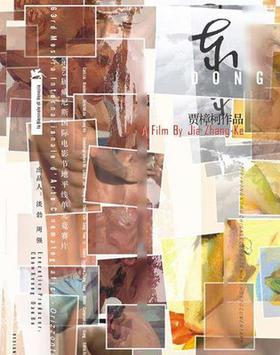
Dong is a 2006 documentary film by Chinese director, Jia Zhangke. The film follows the artist and actor Liu Xiaodong as he invites Jia to film him while he paints a group of labourers near the Three Gorges Dam and later a group of women in Bangkok. The film was produced and distributed by Jia's own production company, Xstream Pictures, based out of Hong Kong and Beijing.

24 City is a 2008 Chinese film directed and co-written by Jia Zhangke. The film follows three generations of characters in Chengdu as a state-owned factory gives way to a modern apartment complex. The film was also known as The Story of 24 City during production.
In Public is a short documentary film directed by Jia Zhangke, a Chinese cinema "Sixth Generation" movement filmmaker. In Public was shot on digital video for the 2001 Jeonju International Film Festival.

Bliss is a 2006 Chinese family drama film directed by Sheng Zhimin and produced by Hong Kong director Fruit Chan. The film was Sheng's first as a director, having previously served as a line producer for Chan and Jia Zhangke on films such as Durian Durian and Platform.
Han Sanming is a Chinese actor and coal miner, known for his roles in films directed by his cousin Jia Zhangke. Initially, he was seen only in small roles or cameos, but was then cast in one of the lead roles, as a coal miner looking for his wife and daughter, in Still Life. The film premiered at the 2006 Venice Film Festival and went on to win a Golden Lion award.

A Touch of Sin is a 2013 Chinese anthology thriller film written and directed by Jia Zhangke and starring Jiang Wu, Wang Baoqiang, Luo Lanshan, and Zhao Tao, Jia's wife and longtime collaborator. The film consists of four loosely interconnected tableaus set in vastly different geographical and social milieus across modern-day China, based on recent events while also drawing from wuxia stories and Chinese opera. The English title references A Touch of Zen. It was nominated for the Palme d'Or at the 2013 Cannes Film Festival, with Jia winning the award for Best Screenplay.

Mountains May Depart is a 2015 Mandarin-language drama and the 8th feature film directed by Jia Zhangke. It competed for the Palme d'Or at the 2015 Cannes Film Festival. and was also selected to be shown in the Special Presentations section of the 2015 Toronto International Film Festival.
Post 70s Generation is a literary critical term in Chinese contemporary literature, which refers to the new generation of writers who were born after 1970 in China. In some criticism these writers have also been described as the 'Post Cultural Revolution Generation', or 'Post Maoism Generation' as they grew up after Mao's death.
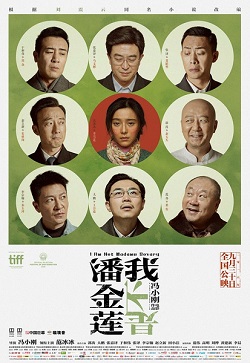
I Am Not Pan Jinlian, known in English as I Am Not Madame Bovary, is a 2016 Chinese comedy film directed by Feng Xiaogang and written by Liu Zhenyun, based on Liu's 2012 novel I Did Not Kill My Husband. The film stars Fan Bingbing, Zhang Jiayi, Yu Hewei, Dong Chengpeng and Guo Tao. It was selected to be screened in the Special Presentations section at the 2016 Toronto International Film Festival. and won the award for Best Achievement in Directing at the Asia Pacific Screen Awards. It was released in China on 18 November 2016.
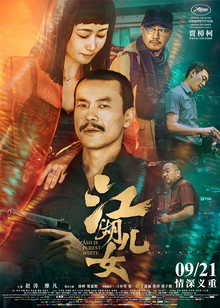
Ash Is Purest White is a 2018 Chinese drama directed by Jia Zhangke. It was selected to compete for the Palme d'Or at the 2018 Cannes Film Festival. The story is loosely based on the leader of a gang from Jia Zhangke's childhood, whom he had admired as a role model. Like the rest of Jia's films, it opened to widespread acclaim.
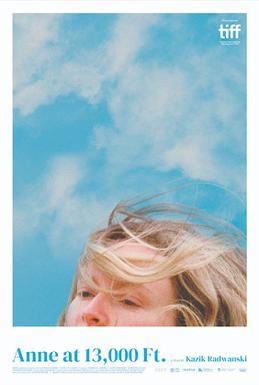
Anne at 13,000 Ft. is a 2019 Canadian drama film. Directed and written by Kazik Radwanski, the film stars Deragh Campbell as Anne, a shy, socially awkward daycare worker whose attitude to her life and work is radically transformed after she skydives for the first time. It premiered in the Platform Prize program at the 2019 Toronto International Film Festival, and received an honourable mention from the Platform Prize jury. In December 2019, the film was named to TIFF's annual year-end Canada's Top Ten list. After premiering on the festival circuit in 2019, the film's 2020 theatrical release was postponed until 2021 due to the COVID-19 pandemic.
Swimming Out Till the Sea Turns Blue is a 2020 documentary film by Jia Zhangke about three authors attending a literary festival in his hometown in Shanxi.
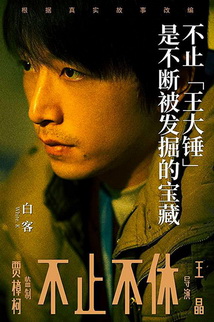
The Best Is Yet to Come is a 2020 Chinese drama film directed by Wang Jing, in his feature film debut.















